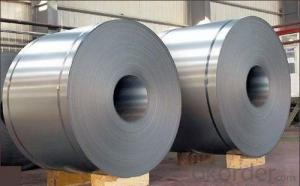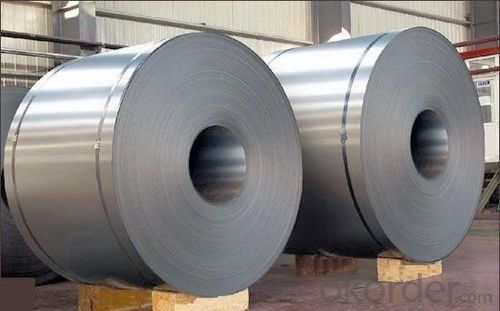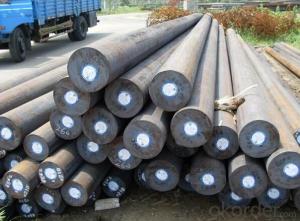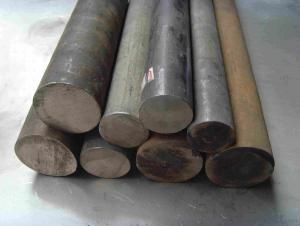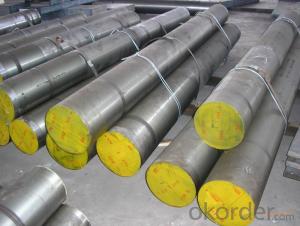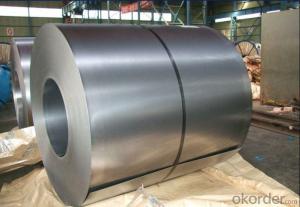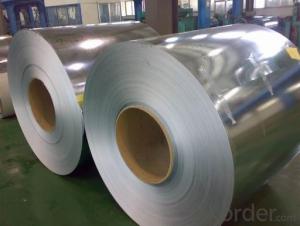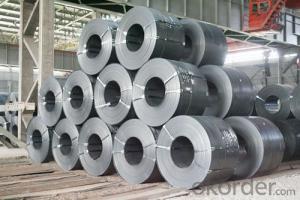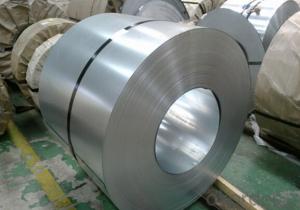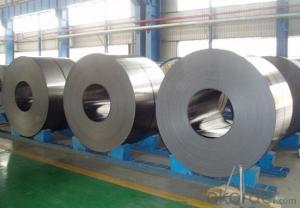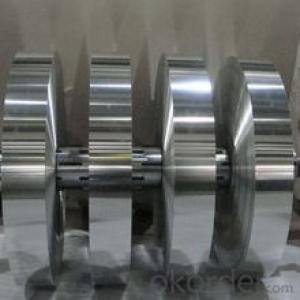Grade Q450NQR1 Corten Steel Coil 4.0*1050*C
- Loading Port:
- Shanghai
- Payment Terms:
- TT or LC
- Min Order Qty:
- 100 m.t
- Supply Capability:
- 20000 m.t/month
OKorder Service Pledge
OKorder Financial Service
You Might Also Like
Grade Q450NQR1 Corten Steel Coil 4.0*1050*C
Description:
-Grade: Q450NQR1
-Specification: 4.0*1050 in coil
Chemical Composition(%) of Grade Q450NQR1 Corten Steel Coil 4.0*1050*C:
| C | Si | Mn | P | S | Cu | Ti/V | Cr | Ni | RE |
| ≤0.12 | ≤0.75 | ≤1.50 | ≤0.025 | ≤0.008 | 0.20~0.55 | / | 0.30~1.25 | 0.12~0.65 | / |
Mechanical Properties of Grade Q450NQR1 Corten Steel Coil 4.0*1050*C:
| Thickness(mm) | Y.S(MPa) | T.S(MPa) | EL. A5% | Bend 180o | Impact Test | |
| oC | AKV J | |||||
| ≤6 | ≥450 | ≥550 | ≥20 | d=a | -40 | ≥60 |
| 6~14 | d=2a | |||||
| >14 | d=3a | |||||
Application of Grade Q450NQR1 Corten Steel Coil 4.0*1050*C:
Used in different weather. It has good anti rust protection and welding ability and is used in shipping container,support frame of outside building etc. Remarkably enhances the anti-corrosive performance of the structural element, lengthens the structural element service life, uses in manufacturing each kind of structural element which was used under the atmospheric envirenment and the caustic gas, the liquid envirenment.
Payment:
-Invoicing on theoretical weight or actual weight as customer’s request.
-FOB, CFR or CIF.
-Regular terms of payment:
1, 30% payment in advance, the remaining balance (70% payment) against the copy of B/L.
2, 30% payment in advance, the remaining balance (70% L/C) against the copy of B/L.
3, Negotiable.
-The payment terms will be written in contraction detailedly.
FAQ:
Q1: Why buy Materials & Equipment from OKorder.com?
A1: All products offered byOKorder.com are carefully selected from China's most reliable manufacturing enterprises. Through its ISO certifications, OKorder.com adheres to the highest standards and a commitment to supply chain safety and customer satisfaction.
Q2: How do we guarantee the quality of our products?
A2: We have established an advanced quality management system which conducts strict quality tests at every step, from raw materials to the final product. At the same time, we provide extensive follow-up service assurances as required.
Q3: How soon can we receive the product after purchase?
A3: Within three days of placing an order, we will arrange production. The shipping date is dependent upon the quatity, how many sizes you want and the plan of production, but is typically 1 month to 2 month days from the beginning of production.
Images of Grade Q450NQR1 Corten Steel Coil 4.0*1050*C:
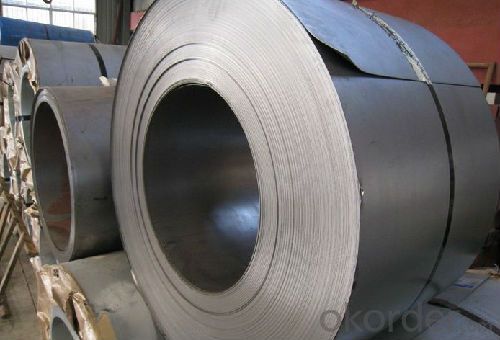
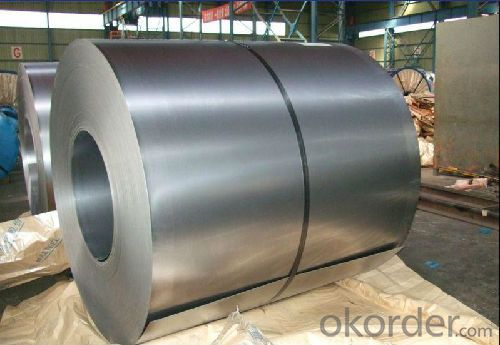
*If you would like to get our price, please inform us the size, standard/material and quantity. Thank you very much for your attention.
- Q: What are the specific requirements for special steel used in the mining industry?
- Special steel used in the mining industry must possess high strength, durability, and resistance to extreme conditions such as abrasion, impact, and corrosion. It should have excellent toughness and hardness to withstand the harsh environments encountered in mining operations. Additionally, the steel should be able to maintain its mechanical properties even at elevated temperatures and be capable of withstanding heavy loads and intense vibrations.
- Q: How does special steel perform in cryogenic impact resistance?
- Special steel performs well in cryogenic impact resistance due to its high strength, toughness, and ability to retain these properties at extremely low temperatures. This makes it suitable for applications requiring exceptional resistance to fracture and deformation under cryogenic conditions.
- Q: Can special steel be used in marine applications?
- Marine applications can indeed utilize special steel. This type of steel, also referred to as marine grade steel, is specifically engineered to endure the demanding conditions found in marine environments. It possesses exceptional qualities, including heightened resistance to corrosion, increased strength, and enhanced durability, which render it suitable for a wide range of marine applications. The construction of ships, offshore structures, and marine equipment commonly employs special steel. Its capacity to withstand corrosion from saltwater, chemicals, and other environmental factors makes it an excellent choice for marine applications. Additionally, special steel finds use in the production of propellers, shafts, and other components that necessitate high tensile strength and fatigue resistance. All in all, special steel proves to be a dependable and efficient material for marine applications due to its unique properties and ability to withstand the challenges presented by the marine environment.
- Q: What are the different forming techniques for special steel?
- Some of the different forming techniques for special steel include hot forging, cold forging, extrusion, rolling, and casting. These techniques allow for the shaping and manipulation of the steel to meet specific requirements, such as strength, durability, and dimensional accuracy. Each technique has its own advantages and can be chosen based on the desired outcome and the characteristics of the special steel being used.
- Q: What are the different electrical grades of special steel?
- There exist various specialized types of steel that possess exceptional electrical properties. These types include: 1. Silicon Electrical Steel: This particular grade of steel contains a significant silicon content, typically ranging from 3% to 4%. The inclusion of silicon aids in minimizing eddy current losses and enhancing the steel's magnetic properties. Consequently, it becomes an ideal choice for utilization in electrical motors and transformers. 2. Stainless Electrical Steel: This specialized steel grade is crafted from stainless steel alloys, renowned for their remarkable resistance to corrosion. Additionally, stainless electrical steel exhibits low electrical resistivity and high thermal conductivity, making it well-suited for electrical connectors, terminals, and other components that necessitate excellent electrical conductivity and resistance to oxidation. 3. Tool Steel for Electrical Purposes: Tool steels are commonly employed in the production of various tools and dies. Certain tool steels are specifically engineered to possess enhanced electrical properties, including heightened electrical conductivity and resistance to heat. These grades are frequently utilized in the fabrication of electrical contacts, switches, and other electrical components that require exceptional resistance to wear and superior electrical performance. 4. Copper-Clad Steel for Electrical Applications: This specialized steel grade is created by bonding a layer of copper to a steel core. The copper layer offers outstanding electrical conductivity, while the steel core provides durability and strength. Electrical copper-clad steel is commonly employed in applications where high electrical conductivity is imperative, such as power transmission lines and grounding systems. In conclusion, the diverse electrical grades of specialized steel offer a variety of electrical properties to meet the specific requirements of various electrical applications. These grades are meticulously engineered to deliver optimal electrical performance, durability, and resistance to corrosion and wear.
- Q: How is electrical steel used in the production of transformers and motors?
- Electrical steel is primarily used in the production of transformers and motors due to its unique magnetic properties. It is a type of steel that has been specifically designed to have high magnetic permeability, low core losses, and reduced eddy current losses. These properties make electrical steel an ideal material for constructing the cores of transformers and motors. The laminated structure of electrical steel helps to minimize energy losses by reducing the impact of eddy currents. Overall, electrical steel plays a crucial role in enhancing the efficiency and performance of transformers and motors by optimizing the magnetic circuit and reducing energy losses.
- Q: How does special steel contribute to the aerospace racing industry?
- Special steel contributes to the aerospace racing industry by providing high strength, durability, and resistance to extreme temperatures, which are crucial for the development of advanced aircraft and spacecraft components. It is used in critical parts like turbine blades, landing gear, and engine components, enhancing performance, efficiency, and safety. Additionally, special steel's lightweight properties enable the production of lighter aircraft, resulting in improved fuel efficiency and increased speed.
- Q: How does the hardness of special steel affect its machinability?
- The hardness of special steel has a direct impact on its machinability. Generally, as the hardness of steel increases, its machinability decreases. Harder steel is more difficult to cut, shape, and form due to its increased resistance to deformation. Consequently, machining operations, such as drilling, milling, or turning, become more challenging and require specialized tools and techniques to achieve the desired results.
- Q: Can special steel be used in the production of kitchen utensils?
- Yes, special steel can be used in the production of kitchen utensils. Special steel, such as stainless steel, offers excellent durability, corrosion resistance, and hygiene, making it a popular choice for kitchen utensils. It can withstand high temperatures, resist staining, and is easy to clean, making it suitable for various cooking and food preparation tasks.
- Q: What are the limitations of welding special steel?
- There are several limitations associated with welding special steel. Firstly, special steels often have high carbon content or alloying elements, which can lead to increased susceptibility to cracking during the welding process. Additionally, special steels may have unique microstructures, such as high hardness or brittleness, which can pose challenges in achieving proper weld penetration and joint strength. Furthermore, the heat input required for welding special steels can result in distortion or warping of the workpiece, requiring additional post-welding processes to correct. Finally, special steels may require specific pre-welding preparations, such as preheating or special welding consumables, which can increase the complexity and cost of the welding process.
Send your message to us
Grade Q450NQR1 Corten Steel Coil 4.0*1050*C
- Loading Port:
- Shanghai
- Payment Terms:
- TT or LC
- Min Order Qty:
- 100 m.t
- Supply Capability:
- 20000 m.t/month
OKorder Service Pledge
OKorder Financial Service
Similar products
Hot products
Hot Searches
Related keywords
